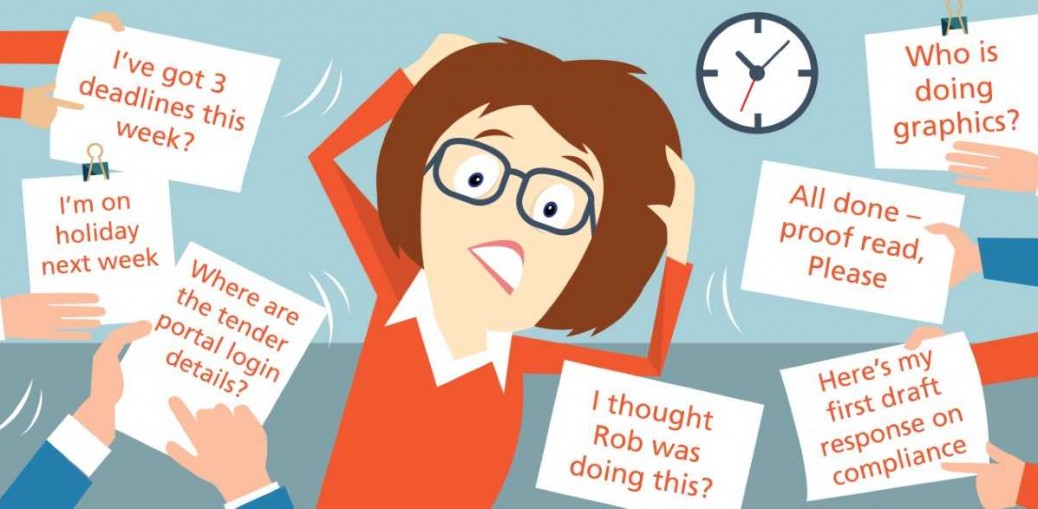Writing and completing bids and tenders is stressful. With competing deadlines, no time to write and other tasks needing your attention, a bid writer is going to feel the pressure to succeed. Pressure is good, but not when the stress gets too much – that’s when quality of work slips and mistakes can be made.
What are the signs of bid writing stress?
Stress is a universal emotion, but bid writers are likely to experience high levels due to strict deadlines and high stakes. Physical symptoms of stress can include:
- Aches and pains
- Feeling ill all the time
- Struggling to sleep
- Appetite changes
- Overactive mind
What can you do to combat the symptoms of high-level stress? Here are a few tips on how to ease your stress levels during the bid writing process.
Be selective
The biggest question bid writers face is whether they can win the bid they have been assigned. This means looking at the resources, time and money that have been allocated to the task, as well as the bid writer’s own background knowledge of the tender. What is a good indicator you could win? Using the free bid/no bid tool, you can ascertain whether you have a good chance of winning the bid being presented, saving you time later on.
Assign ownership
A bid is a big task to take on, but you can’t do it all alone. If you are the bid manager, make sure you delegate work to the rest of your team. It is also important to make sure they are aware of what is expected of them, and when the deadlines are. This is where the stress can build if you and your team aren’t aware of what the others are doing. You don’t want excuses to roll in last minute!
Knowing what you and your team are working towards will give structure to your day-to-day routine. You can do this either in an excel sheet or use efficient document management software like EasyPQQ, which links you with your colleagues, so you are all using the same system in real-time.
Keeping on top of things
The key to staying calm is keeping organised throughout the duration of the bid. Think about the resources at your disposal, such as your colleagues or other aids, especially if you are struggling to hit the deadlines. You’ll feel more in control. It helps to put in earlier deadlines so that you are always ahead, in case of those last-minute changes or staff emergencies.
Flexibility is key
It can be frustrating when a client changes their mind, or a mistake has delayed your work. It can be demoralising after you’ve worked so hard, but life happens. Sometimes you need to let go of your rigid plan and go with the flow to get the best results.
Switch off
Don’t take your work home, if you can help it. You may need to work overtime to hit deadlines, but once you have finished work for the day, switch off and do something relaxing. Whether that’s watching tv, reading a book or exercising, take some time for yourself away from the bid(s) at hand. It can be difficult in busy periods to switch off completely, but for your work/life balance, it is important you try to relax in your down-time. Make sure you eat, sleep, and most importantly, breathe!
Things to remember:
- Be selective about taking on bids with the bid/no bid tool
- Diarise everything
- Work with your team – it’s not all down to you
- Relax in your down-time – a bid shouldn’t take over your life
Reduce your bid writing stress now
Are you struggling with a bid? Need some assistance but don’t know where to turn? Propeller Studios can help, with our experienced and qualified bid consultants, who specialise in writing winning bids and proposals. Visit our website to find out how we can help you.
Professional Mental Health & Stress Management Guidance
If you feel you need professional advice on stress management or mental health either inside or outside of work, visit Mind, the national mental health charity, for more information.


